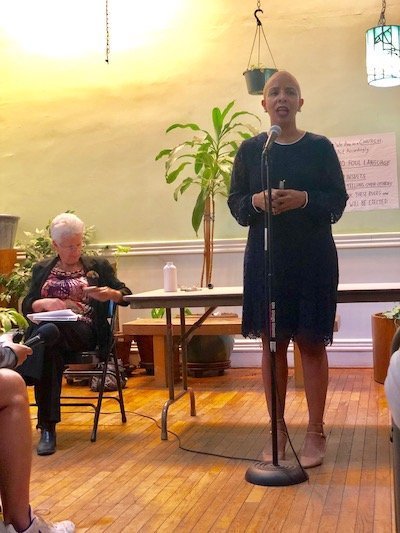A city pilot program that left residents of Greene Ave with tow boots and heavy parking tickets on their cars, elicited a public forum on what Fort Greene and Clinton Hill residents have dubbed the city’s Department of Transportation’s (DOT) “war on cars”.
Local residents Shellie Hagan and Lucy Koteen called for the town hall meeting at the Lafayette Avenue Presbyterian Church, 85 South Oxford Street, which drew a cross-section of generational residents from Fort Greene and Clinton Hill. Also in attendance were City Councilwoman Laurie Cumbo (D-Fort Greene Clinton Hill, Prospect Heights, Crown Heights) and the former Democratic District Leader from the neighborhood, Renee Collymore.
Lines were drawn early on between residents for and against the DOT’s city plans, boiling down to car owners and bike riders being at odds with each other for the remainder of the meeting.
Voicing the concerns of residents against the DOT’s new programs, Koteen stated, “The DOT, in my opinion, has taken over our streets in a way that affects our personal life and works to dictate how we should live. They have done so without talking to those who live here and getting consent. Changing our streets, change our lives. We need to all be part of the conversation and discussion, we have seen in many cases a lack of response from the DOT.”

In response to calls by certain members of the community calling for a ban on cars, Koteen went on to say, “As we all know there has been a huge growth in bike ridership throughout the city and throughout the world, and changes have to be made to accommodate this new reality. But we don’t want one voice to dominate the change. I hope that we can find a way to make the city livable to all modes of transportation and to fit everyone’s needs.”
Alluding to the disagreement regarding the DOT’s program on Greene Avenue, Cumbo said it’s more the DOT rolls out these programs that is problematic.
“DOT has to learn to respect the community. You’re not taking community participation into account when you are creating these community programs, and thereby when you roll them out it creates huge discrepancies and gaps between what’s going to work for a really diverse community of schools, churches of double parking, local businesses, and all these things. So they have to begin the revolutionary process of talking to the community before they roll out whatever they roll out. We recognize this has to happen, but it has to happen responsibly with our input,” said Cumbo.
In response to the residents advocating against the DOT’s program, multiple residents present at the meeting raised concerns regarding the high number of car-related fatalities and general safety concerns for bikers on city roads.
“I think that a huge step towards making the city more walkable, bikeable, and more likely that no 10-year old isn’t killed waiting for a bus in the morning is to say that we should get rid of cars and to do that we need to first get rid of parking,” said a resident who lives around Bedford Avenue and Willoughby Street, and identified himself as Joe.
“Cyclists, we weigh 200 pounds and go 10 miles an hour. Cyclists don’t kill people,” he said.
What became increasingly evident was the clear generational gap between the two sides, where there was clearly, a fundamental difference in the understanding of public spaces and what it entailed.
While one side argued against the practicality of everybody being able to forego a car for a bicycle, the other half railed at the inability of car-owners to adapt to changing times, and circumstances.
With neither side willing to back down, the possibility of a reconciliation or compromise appears to be a distant prospect as of now.










